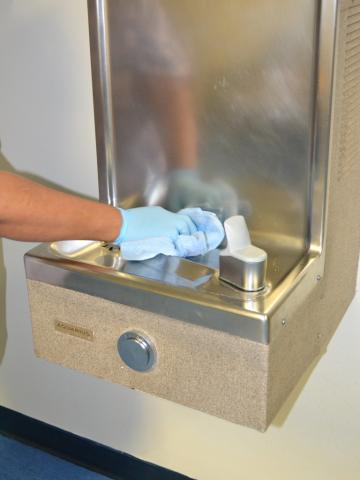Cleaning for Health
Updated March 11, 2020
Caretaking Services Manager Judy Jaeger is quick to note that her staff has not needed to change any of its cleaning practices as the products and standards they use on a daily basis are specifically designed to sanitize campus and halt any potential outbreaks.
“We do this daily, year-round, regardless of whether there is an outbreak situation or not,” says Jaeger. “We are very aware of the important role we play in keeping our campus community safe and the practices we use are of the highest standard.”
On a daily basis, Monday through Friday, the caretaking staff disinfects all classroom desks as well as the instructor desks and phone areas in each classroom. As well, all common area door handles, light switches, phones and washroom fixtures are disinfected.
Other areas disinfected daily include meeting room tables, lunchrooms, and all washroom sinks, toilets and urinals. Floors are also washed on a daily basis.
“WE teach our staff to clean from clean to dirty so that we do not contaminate surfaces,” adds Jaeger. “We use microfibre cloths and mops and we never double-dip. We wipe surfaces and never contaminate our disinfectant by putting our cloths back into the solution to use again. Rather we launder the cloth and use another.”
Her group is also in charge of keeping all campus hand sanitizer dispensers full and wiping them down as required. They are well stocked going forward.
“The disinfectant we clean with is a germicidal detergent, virucide, bactericide,” she says. “It’s an eco-friendly product made in Alberta. We also employ electrostatic cleaning machines that can kill viruses and bacteria in two minutes or less and utilize steamers that produces a high intensity steam that quickly eliminates virus and bacteria.”
For more information on the U of L’s cleaning practices, contact Jaeger at caretaking@uleth.ca or visit their web page.
For more information regarding the University of Lethbridge Campus Risk and Safety Services and the COVID-19 (Novel Coronavirus) visit their web page.
By staying up to date of the latest trends in cleaning and sanitation, Caretaking has made a number of physical and procedural changes to reduce the spread of germs that can cause illness.
Some of these changes are visible and directly affect users such as the no-touch towel dispensers, which greatly reduces the risk of cross contamination in washrooms, and using microfiber cloths and mops that can pick up and hold small particles and help rid of dirt and bacteria as small as four microns.
Other changes are not as obvious but still directly affect the users such as training Caretaking staff disinfect classroom desks, door handles, light switches and other frequently touched surfaces DAILY.

